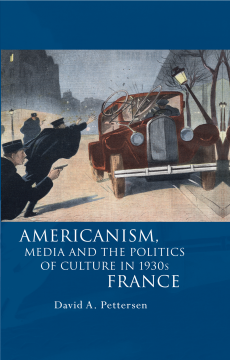
Additional Information
Book Details
Abstract
Gangsters, aviators, hard-boiled detectives, gunslingers, jazz and images of the American metropolis were all an inextricable part of the cultural landscape of interwar France. While the French 1930s have long been understood as profoundly anti-American, this book shows how a young, up-and-coming generation of 1930s French writers and filmmakers approached American culture with admiration as well as criticism. For some, the imaginary America that circulated through Hollywood films, newspaper reports, radio programming and translated fiction represented the society of the future, while for others it embodied a dire threat to French identity. This book brings an innovative transatlantic perspective to 1930s French culture, focusing on several of the most famous figures from the 1930s – including Marcel Carné, Louis-Ferdinand Céline, Pierre Drieu la Rochelle, Julien Duvivier, André Malraux, Jean Renoir and Jean-Paul Sartre – to track the ways in which they sought to reinterpret the political and social dimensions of modernism for mass audiences via an imaginary America.
Table of Contents
| Section Title | Page | Action | Price |
|---|---|---|---|
| Cover | Back Cover | ||
| Title | FM4 | ||
| Copyright | FM5 | ||
| Contents | FM8 | ||
| Acknowledgements | FM12 | ||
| List of illustrations | FM16 | ||
| Notes to the Reader | FM18 | ||
| Introduction | 1 | ||
| Chapter 1: Mass Culture and Leftist Politics in Jean Renoir | 26 | ||
| Chapter 2: The American Gangster inFrench Poetic Realism | 62 | ||
| Chapter 3: The Rise and Fall of the Gangster in André Malraux’s Revolutionary Novels | 109 | ||
| Chapter 4: White Primitivism in Pierre Drieu la Rochelle | 141 | ||
| Chapter 5: Whitewashing theTransatlantic in Louis-Ferdinand Céline | 174 | ||
| Chapter 6: The Americanist Anti-Americanism of Jean-Paul Sartre’s Les Chemins de la liberté | 206 | ||
| Conclusion | 244 | ||
| Notes | 255 | ||
| Bibliography | 292 | ||
| Index | 305 | ||
| Back Cover | Back Cover |
